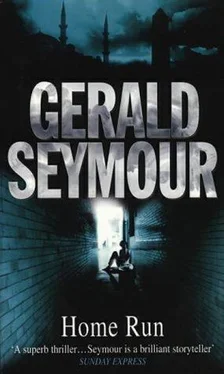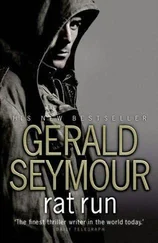Gerald Seymour - Home Run
Здесь есть возможность читать онлайн «Gerald Seymour - Home Run» весь текст электронной книги совершенно бесплатно (целиком полную версию без сокращений). В некоторых случаях можно слушать аудио, скачать через торрент в формате fb2 и присутствует краткое содержание. Жанр: Триллер, на английском языке. Описание произведения, (предисловие) а так же отзывы посетителей доступны на портале библиотеки ЛибКат.
- Название:Home Run
- Автор:
- Жанр:
- Год:неизвестен
- ISBN:нет данных
- Рейтинг книги:5 / 5. Голосов: 1
-
Избранное:Добавить в избранное
- Отзывы:
-
Ваша оценка:
- 100
- 1
- 2
- 3
- 4
- 5
Home Run: краткое содержание, описание и аннотация
Предлагаем к чтению аннотацию, описание, краткое содержание или предисловие (зависит от того, что написал сам автор книги «Home Run»). Если вы не нашли необходимую информацию о книге — напишите в комментариях, мы постараемся отыскать её.
Home Run — читать онлайн бесплатно полную книгу (весь текст) целиком
Ниже представлен текст книги, разбитый по страницам. Система сохранения места последней прочитанной страницы, позволяет с удобством читать онлайн бесплатно книгу «Home Run», без необходимости каждый раз заново искать на чём Вы остановились. Поставьте закладку, и сможете в любой момент перейти на страницу, на которой закончили чтение.
Интервал:
Закладка:
• •*
Mattie Furniss knew it was late at night.
It seemed an age since they had carried away the tray on which his supper plate had been, and the glass of water.
They came for him when he was lying on his bed, when he had taken off his trousers, and he had pulled the blanket over his body to hide his nakedness from the peephole. His underpants were hanging over the bottom of the bedframe to dry.
It had been a hideous day. He had been waiting for the rattle of the door, and the sight of the men come to take him down to the cellar. There had only been the tray with his food in the early morning, and the tray for his food in the early evening. He had heard a car come in what he had judged to be the middle of the day, and he had heard voices outside, and he thought that he had heard the voice of the investigator, but they had not come for him.
He could walk, just about, on his own. The soles of his feet were heavily swollen, but he had learned a rolling gait that would take him over a short distance. He was hunched from the strain that had been put on his shoulders.
When at last they came, they had not allowed him time to put on his trousers, nor the pants, nor his socks. Between his guards, Mattie Furniss went down the stairs. He wore only his shirt. He was hobbling and bent. He was beyond reach of help, he was going towards pain.
Down the stairs and into the hallway, and his instinctive turn was to the left, towards the doorway to the cellar. He was pulled to the right.
He stumbled and fell. They let him go down, and his knees felt the coolness of the tiled floor. They jerked him up and on to his feet and the pain shivered through him.
They took him through a kitchen. There were moths arcing around the light bulb that had no shade. There were two large metal pots on an electric cooker and on the table there were plates laid out with salads at the side. He saw the food that was unlike anything that was brought on the trays to his prison room. He was frog-marched through the kitchen and out into the glare of the lights in what he thought must be the yard at the back of the house.
The light came from the headlamps of a Mercedes car. The lights threw a bright wash across the yard and against the wall of concrete blocks. He thought the height of the wall was a foot or so above the height of his own head had he been standing erect and not been bent by the pain in his shoulders and ribs. That, too, was instinctive, that he checked the height of the wall. Many scenes now, all fast in his mind.
He saw the pockmarks where bullets had struck the wall, and the holes were in a group that was only three, four, feet across. He saw the guard who cradled a rifle, probably a Soviet AK-74, across his elbow. He saw the investigator standing with his hands deep in the pockets of his trousers. He saw a young cleric with the turban of brilliant white and the camel hair cape and the thin-rimmed spectacles.
It was done as if it were a routine in which the only character who didn't know his part was Mattie. And he was learning, so fast. No talk. The sounds of the engine of the Mercedes tilling and of the scrape of Mattie's feet across the hard earth yard. The feet scraped because he was losing the power to walk, going jelly in the legs. Across the yard to the place in the wall with the bullet holes.
They had to drag him.
The use was gone from his legs. Thinking of Harriet who was his wife. Thinking of the cottage that was his home.
Wanting to plead, and wanting to cry, and the voices strangled In his throat. Against the wall the guards loosed his arms. He collapsed. The dirt was on his knees, and on his arms and on his chest. Death was grovelling in the dirt yard of a villa on the outskirts of Tabriz. Death was choking in the night air, beyond the reach of help. Death was feeling the slackening of the gut muscles… Death was the metallic crack as a Soviet rifle was cocked. There was a hand in his hair and his head was wrenched upwards and his body weight was taken so that he was left in a kneeling position and the cold damp dirt of the yard cloyed on his privates. Too frightened to pray, like that Lutheran pastor would have prayed. Thinking of all those who were too far from him to help him, but closer than the God he hadn't troubled to know. Thinking of the men at Century and Flossie Duggan. Thinking of Harriet alone in the cottage at Bibury where the spring was over and the summer was coming, and of Will, who would be coming soon to cut the grass around the apple trees. Thinking of the agents in Tehran and Tabriz and the Harbourmaster's office in Bandar Abbas. Thinking of Char he who should have been his son. They would all see the morning, they would all know the freshness of another day. The morning, and another day, they were beyond his reach.
Against the back of his neck, where his hair thinned out, was the pressure of the barrel of the rifle. There was a pain prick from the fore-sight.
No questions.
No demand for names.
He opened his eyes. He saw the face of the investigator and the face of the cleric, expressionless.
He was shaking, and as his neck rolled so the muzzle of the weapon followed.
There was the firing click.
His ears exploded. His stomach failed.
He rolled, fell, collapsed.
He was on the dirt in the yard, and his mouth gaped and bit at the filth.
Mattie heard the low chuckle of the investigator. His eyes opened. He gazed into the cleric's face. He saw a silently mirthless smile.
He was pulled to his feet. His urine had run down the length of his thighs and had stained the dirt. He couldn't speak, couldn't help himself up. He made no attempt to cover himself as they took him back into the kitchen and past the cooker where a meal was in preparation, and up the stairs, and back to his prison room.
He was their toy.
On his bed he wept. The names were in his mind. In his mind were the names of the agents and the name of Charlie Eshraq.
Mattie could recognise it all, the shredding of his will to light.
From his room he could see the west face of the clock. Big lien showing a couple of minutes past midnight. He had slept on the decision, and he had killed a whole day on the decision.
He had taken advice, but the decision was his. He could keep his options open no longer.
He went down to the thirteenth floor.
He didn't knock, he went straight into the room. A very strange noise in the room stopped him in his tracks. Past midnight in Central London and the sounds were of the countryside at dawn. They'd put old Henry Carter on night duty. Finding a job for Henry in the twilight of his service at Century was putting him on night duty in the room used by the Crisis Management Committee. There was a camp bed over by the window. The man wore long combination underpants and a woollen vest with short sleeves and buttons at the throat. Typical of Whitehall, typical of government service, that a Crisis Management Committee should wind up once it was past midnight as a solitary individual, past retirement if he wasn't mistaken, sitting in ancient underclothes, and listening to God knew what… The man was quick off the bed, and was straight into his suit trousers, and was hooking on the braces over his vest. Didn't bother with his shirt. There was an expensive radio on the floor and a cassette was playing through it. A sharp note on the track amongst what, to the Director General, was a clatter of noise, and he saw the attention of Henry Carter waver, then disappear. A moment of bliss on his face. He switched off the machine.
"Sorry, sir, bless you for your patience… phylloscopus inornatus, that's the Yellow-Browed Warbler, a little beauty.
I did the tape in Norfolk last weekend. I thought I had her, never can be sure. Very intense, very penetrating call. Did you hear it, sir? Just off to Siberia for the summer, remarkable little lady… Apologies, you didn't come in here to listen to a Yellow-Browed Warbler."
Читать дальшеИнтервал:
Закладка:
Похожие книги на «Home Run»
Представляем Вашему вниманию похожие книги на «Home Run» списком для выбора. Мы отобрали схожую по названию и смыслу литературу в надежде предоставить читателям больше вариантов отыскать новые, интересные, ещё непрочитанные произведения.
Обсуждение, отзывы о книге «Home Run» и просто собственные мнения читателей. Оставьте ваши комментарии, напишите, что Вы думаете о произведении, его смысле или главных героях. Укажите что конкретно понравилось, а что нет, и почему Вы так считаете.












